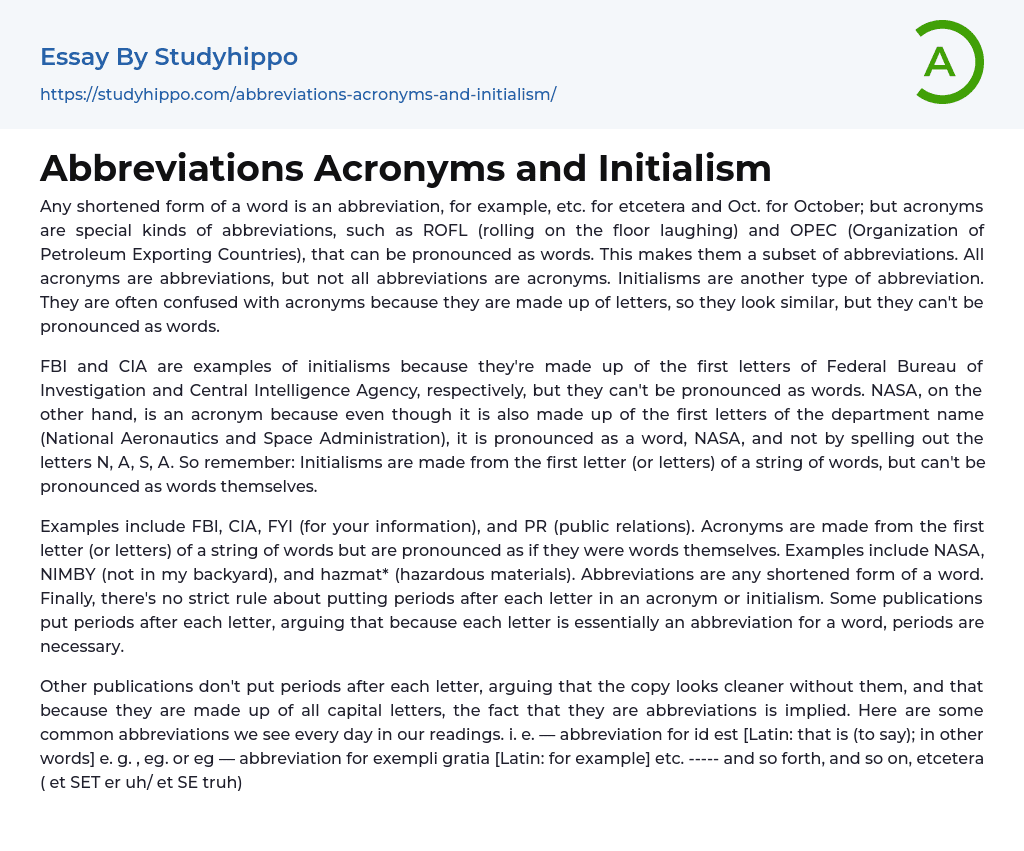Any shortened form of a word is an abbreviation, for example, etc. for etcetera and Oct. for October; but acronyms are special kinds of abbreviations, such as ROFL (rolling on the floor laughing) and OPEC (Organization of Petroleum Exporting Countries), that can be pronounced as words. This makes them a subset of abbreviations. All acronyms are abbreviations, but not all abbreviations are acronyms. Initialisms are another type of abbreviation. They are often confused with acronyms because they are made up of letters, so they look similar, but they can't be pronounced as words.
FBI and CIA are examples of initialisms because they're made up of the first letters of Federal Bureau of Investigation and Central Intelligence Agency, respectively, but they can't be pronounced as words. NASA, on the other hand, is an acronym b
...ecause even though it is also made up of the first letters of the department name (National Aeronautics and Space Administration), it is pronounced as a word, NASA, and not by spelling out the letters N, A, S, A. So remember: Initialisms are made from the first letter (or letters) of a string of words, but can't be pronounced as words themselves.
Examples include FBI, CIA, FYI (for your information), and PR (public relations). Acronyms are made from the first letter (or letters) of a string of words but are pronounced as if they were words themselves. Examples include NASA, NIMBY (not in my backyard), and hazmat* (hazardous materials). Abbreviations are any shortened form of a word. Finally, there's no strict rule about putting periods after each letter in an acronym or initialism. Some publications put periods after each letter, arguing
that because each letter is essentially an abbreviation for a word, periods are necessary.
Other publications don't put periods after each letter, arguing that the copy looks cleaner without them, and that because they are made up of all capital letters, the fact that they are abbreviations is implied. Here are some common abbreviations we see every day in our readings. i. e. — abbreviation for id est [Latin: that is (to say); in other words] e. g. , eg. or eg — abbreviation for exempli gratia [Latin: for example] etc. ----- and so forth, and so on, etcetera ( et SET er uh/ et SE truh)
- Business Law essays
- Contract essays
- Consumer Protection essays
- Property essays
- Ownership essays
- Agreement essays
- Common Law essays
- Contract Law essays
- Justice essays
- Security essays
- Tort Law essays
- United States Constitution essays
- Crime essays
- Lawsuit essays
- Treaty essays
- Family Law essays
- Marijuana Legalization essays
- Constitution essays
- War on Drugs essays
- Court essays
- Jury essays
- Police essays
- Protection essays
- Community Policing essays
- Criminal Law essays
- Judge essays
- Lawyer essays
- Employment Law essays
- Copyright Infringement essays
- Injustice essays
- Intellectual Property essays
- Breach Of Contract essays
- Jurisprudence essays
- Social Injustice essays
- Juvenile Justice essays
- Internet Privacy essays
- Cyber Security essays
- Bill Of Rights essays
- Civil Liberties essays
- First Amendment To The United States Constitution essays
- Fourth Amendment To The United States Constitution essays
- Second amendment essays
- Animal Cruelty essays
- Law Enforcement essays
- Juvenile Justice System essays
- Surveillance essays
- Forensic Science essays
- Crime Prevention essays
- Criminal Justice essays
- Criminology essays




